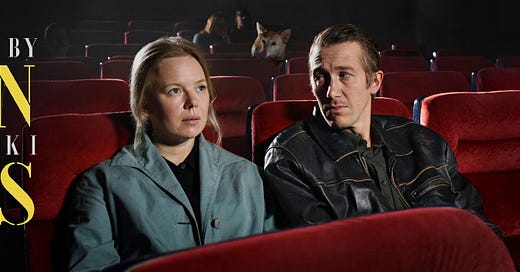Mild spoilers ahead for the movie ‘Fallen Leaves’ (2023; Finnish)
Rom-coms are probably the most polarising genre out there. It has millions of devout fans, who have memorised the New Year’s Eve monologue in When Harry Met Sally, the choreography of the Thriller Dance from 13 Going on 30, or the words to the song ‘She’ from Notting Hill.
But millions of others shudder at the thought of sitting through entirely formulaic, often stereotypically heterosexual characters. Manic pixie girl or boss lady-turned-romantic for the female lead, lovable loser or f-boi-turned-romantic — take your pick. I don’t hate the genre. I’ve cried with Julia Stiles as she recites the ‘I hate you’ poem in 10 Things I Hate About You. I thought How to Lose a Guy in 10 Days was charmingly silly. Annie Hall was to me, in 11th grade, one of the most perfect movies ever made and I still believe it. But the critique is well-founded. Notable exceptions exist. Even though Four Weddings and a Funeral was caught up in the dramas of the British aristocracy, it has a remarkable portrayal of a gay couple, tender and heartbreaking all at once. Nancy Meyer’s Something’s Gotta Give was subversive for its old lead actors. My Best Friend’s Wedding, while otherwise positively psychotic, at least did not end with Mulroney running into Julia Roberts’ arms. But for the most part, the formula remains the same. Most rom-coms known to the English-speaking world invariably have two young white actors playing upper-class New Yorkers or Londoners falling in love over two hours of will they/won’t they. (Spoiler alert: They do.)
One is then delighted to stumble into Fallen Leaves. I don’t recall a rom-com where the central characters are...actually poor. It takes place in a non-time. A 2024 calendar hangs in a bar (the movie was made in 2023), but characters listen to the radio and visit internet cafes seemingly from the '90s. The working-class characters employed in brutalist department stores and construction cites wear trench coats and reside in homes whose colours pop out like they are from a mid-century Godard movie. This non-time adds to the theme of disorientation in the characters’ own lives. She is a woman cruelly fire from her minimum-wage grocery store job for stealing expired food products. He is a drunk chain-smoker who’s also soon to be fired from his construction job. Under the low lights of a grimy bar and the lower lights of a zombie movie, we see love announcing itself.
Humour is probably the most difficult aspect of a language to translate. It is closely linked to a very specific cultural sensibility, concealing within itself, untranslatable idioms and their histories. Yet, sitting in an audience of both balding men and young ones on first dates in a South Indian capital, you would not know that. This is of course partly because the comedy is written cleverly by including quips and deadpan humour. But perhaps the comedy worked because the emotional core of the movie is deeply universal. These are two people, beaten down by a world that just doesn’t wait for them, whose lives improve by the coming of the other and their promise. It is their circumstance that makes us truly believe in the life-affirming quality of their love. They wait outside of the cinema, endlessly and seemingly hopelessly, for each other to come by, for love to arrive. They are rewarded. But that love, too, disappoints them.
Romantic love can often feel this way. I cannot be the only one who, after afternoons of serious thinking resolves to shut myself off and surround myself with cinema, music and books. Art, at least, is consistent. Art, at least, does not disappoint. In the movie, our lead actress tunes out heartache by adopting a dog, that faithful beast. But she chooses love when it returns. As a viewer, I know this too well, that leap of faith that one wishes we could take, towards love and its tantalizing promises. Miracles happen. Our couple walks off into the sunset.
Leaving the cinema hall, the lingering dregs of the film still fresh, some of us swerve off from our cynicism, at least for now and hang around the theatre, because who knows, love may arrive.
Substack’s algorithm works entirely on engagement. If you’d like to help Niveditha grow her Substack and support her work, please be generous with the like, comment and restack buttons.




